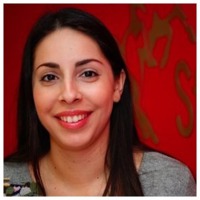
Yalda Jamshidi
Reader in Genomic Medicine/Head of Centre at St George's University of London
Mindset is important, and a love for discovering the unknown.
About Yalda...
Who am I?
"You need a genuine love for your research subject as well as patience, persistence and a strong sense of self reliance. Being friendly and collaborative makes it all the more enjoyable and along the way you are often training and supporting those around you."
What do I do?
"My work centres around evaluating hereditary characteristics of individuals. This can include common inherited traits such as blood pressure or heart function but also rare inherited disorders such as muscular dystrophy and cardiomyopathy. The research can help provide patients with a diagnosis, and a better understanding of the likely course of their condition. This also provides opportunities for more informed family planning and better clinical management. Overall a greater understanding of inherited traits and conditions informs the wider scientific community, and can highlight areas for future drug development.I lead a research group where we use genetic information encoded in your DNA to try to understand the biology of these traits and disorders. In my role I drive and lead specific projects which on a day to day basis can include putting together funding applications to obtain financial support for the work, providing support and training to colleagues working in the group, and sharing findings with the wider scientific and non-scientific community. I also oversee the Genetics Centre at my institution which means I am responsible for line-management, staff development, personal and performance review and workload planning of members of the centre. Together with the Director(s) of the Institute, the role also involves co-ordination of Institute and Institutional strategy. One of the best things is that I get opportunities to travel for research/fact finding/solving scientific problems and meet lots of new people. Everyday is different - I particularly like science communication and engaging with the public to increase awareness of important genetic issues. Trying to find out the cause of diseases is a bit like being a detective and following the clues, but you also get to design experiments to try and uncover more information. There are opportunities for career development, particularly if you are successful at obtaining funding through competitive bids to carry out your research projects, and are effective in directing successful projects leading to publication of your results in scientific magazines."
How did I get here?
"I first took an undergraduate degree in Human Genetics, then a PhD in a more focused area - genetics of heart function. Once my training was complete I took a couple of \"post-doctoral\" jobs where I worked within a group carrying out experiments in the laboratory. The next step to my current role was to become an \"academic lecturer\" - when your salary is effectively paid by a university rather than independent research bodies. Once on the academic track I progressed from Lecturer, to Senior Lecturer, to Reader/Assistant Professor."
The life I live
"In my spare time, I enjoy cake decorating and playing the piano."
My typical day
"Overseeing research projects focusing on the role of genetics in health and disease, answering emails, reading the latest research news, writing up results of experiments for publication, coming up with ideas for future research questions and writing grant proposals to attract funding to answer them, supervising/mentoring students and staff."
My qualifications
"Secondary education (GCSE/O-Levels) Post secondary education (College, A-levels, NVQ3 or equivalent) A level Maths, Chemistry, Biology, Physics Undergraduate degree (BSc, BA, etc.) BSc Human Genetics, Post-graduate degree (MSc, MA, etc.) Postgraduate certificate in Healthcare Education Doctorate (PhD) Genetics "
Yalda's Photos




